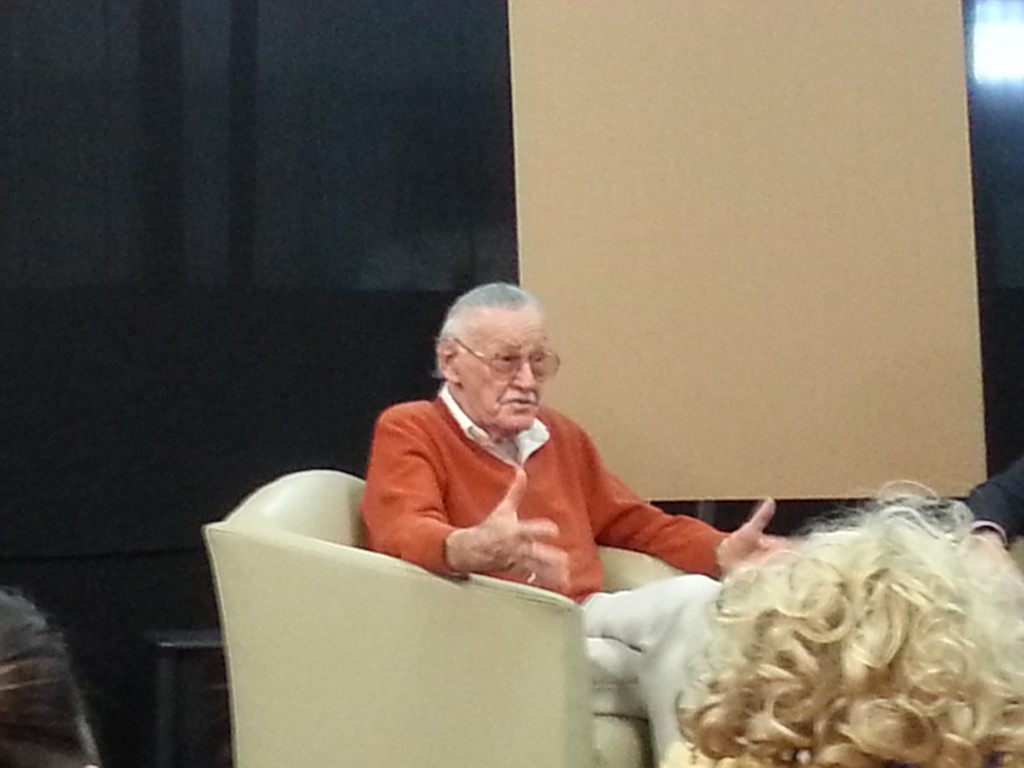
“Welcome True Believers!”
I recently had the luck to travel over to Los Angeles with Podwits contributor J. Blake on what proved to be one of the most exciting, and rewarding trips that I have ever had the pleasure to enjoy. The bulk of that is due to the GREAT content we were able to gather and will be disseminating to you, our Podwit fans, in the coming weeks. EXCLUSIVE interviews will be coming your way… for example, with legendary Hanna Barbara artist, animator and character creator BOB SINGER; and 96-year-young animation icon MARTHA SIGALL, who started working at the Warner Brothers Animation Department in 1937 as an inker at age 19, making $12.50 a week for an average 48 hour work week. So YES, we’ve got some exciting things lined up.

First of all is a PODWITS EXCLUSIVE with comic book titan Stan “The Man” Lee. We were invited to attend a private Q&A hosted by Choice Collectibles that Stan Lee would be doing for a very intimate audience. He spoke for about half an hour, and covered a whole slew of interesting topics, like what he geeked out on as a boy growing up in New York City, his original thoughts on how he came up with so many of his now iconic characters in the comic world, what he didn’t like about some of the movies… and he BROKE NEWS by sharing his thoughts on what he considered his best cameo in his Marvel films.
The Q&A was moderated by the founder and owner of Choice Collectibles, to an audience of no more than 50 people. Here is the breakdown:
Interviewer: So The Avengers made a lot of money…
Stan Lee: Well you see what happen was my cameo was so quick, obviously people said, “Wait! We didn’t see Stan’s cameo!” so they went and bought another ticket, and went back again. So that’s the reason—if not for my cameo, The Avengers would only of made half as much… (big AUDIENCE laugh) So that is the inside story. (audience laugh)
(transition)
I: How do you conceive all of those incredible characters because all of us use our imaginations, but none of us have quite the imagination like yours—
SL: Thank goodness! (audience laugh) Less competition!
I: —how does one come up with all those ideas like the X-Men; the X-Men alone had so many different characters and so many different powers, how did you come up with all those ideas?
SL: With great difficulty. (audience laugh) I don’t know! It’s the funniest thing, it’s the one question you can’t answer. An idea is just something vague, I mean you either have it or you don’t. So what happened with the X-Men, we had already done- now I don’t remember the order of them, we had already done the Fantastic Four, I think we had already done the Hulk, maybe one or two others, and my publisher said “I want you to do another one! Do a group of characters like the Fantastic Four.” So I thought- see the toughest thing with superheroes is what power you’d give them. All the powers were taken. The Human Torch could burst into flame and fly! And Reed could stretch and so forth- and you also had to figure out how do they get the powers? So I had the Fantastic Four get there’s because they were bombarded with cosmic rays; I think the Hulk was hit by gamma rays; I ran outta rays! (audience laugh) So I took the cowardly way out: I’ll get a bunch of characters and I’ll just let them be born that way. It’s easy. So, I went to my publisher, who I had to report to, and I say “Hey I got an idea. They were born that way, they’re mutants. I’m going to call the book ‘the Mutants’.” He said, “That’s a dumb name.” (audience laugh) He was a very bright publisher. He said nobody knows what a mutant is. So I had to do what he said, and I had to dream up another name.
I: So let me get this straight—there was someone else you took direction from? (audience laugh)
SL: Oh yeah, the publisher.
I: That’s the first time I ever had that— (audience laugh)
SL: No—No. I didn’t take direction, I took orders, he said you could either do that or you can’t, he didn’t direct me. (a. laugh) Now that he [the interviewer] interrupted me we have to go back to the beginning- So I don’t remember if it was the Fantastic Four or it was—(audience laugh)—no—so anyway, I couldn’t use the name the Mutants, so I thought, well they have extra powers, and I’m going to make their leader a guy name Professor Xavier, because there were no Xaviers in comics and I wanted to be original, so then I thought, extra power, Xavier, X, I’ll call it the X-Men. So I went to my publisher and said “why don’t we call them the X-Men?” He said, “that sounds great”. So I walked out of his office and I thought, if nobody is gonna know what a mutant is, how are they gonna know what an X-Man is? So that’s the name, and he okayed it, and that’s another chapter in history.
I: But when I watch the movies I am amazed and think, how do you honestly conceive all those powers, like the ability to fly, or the ability to control the weather like Storm, or people how have an endoskeleton with blades like Wolverine? It’s like the most extraordinary thing, like most people can’t think creatively enough to pay their bills on time.
SL: Well I guess the answer is, I am incredibly creative and intelligent—(audience laugh)—I don’t know—
I: And handsome!
SL: And handsome! (laugh) You just work at it. You say: ‘what power isn’t being featured in any story at the moment’? For example, I didn’t create the Human Torch. That was done a million years ago. The first magazine this publisher published, before we were Marvel comics, in the early 40’s, he had a character called the Human Torch, that was created by someone else. It was an android that could burst into flames in flight, and I always liked that idea, so nobody was using it at the time I did the Fantastic Four, so I figured I’ll get a guy who can burst into flames in flight, but he’ll be a human being, not an android. But that had already been done for me. But the other characters, what you do is you think what hasn’t been done? And you try to fill that gap. For instance, take the Hulk. Everything comes from something. The Hulk for example—I had always loved the Frankenstein movie with Boris Karloff, and to me, the monster was the good guy. Because at the beginning, he didn’t want to hurt anybody; but those idiots with torches, were always chasing him up and down the hills. So I thought it would be fun to get a monster, that was the hero. But then I thought that would be pretty dull, just a monster running around. So then I remembered Dr. Jekyll and Mr. Hyde. What if I could get a monster that could change back to a normal human and a monster—that would be great… then I figured what if they both hate each other? That would be even greater! Then I needed a name… and years ago in comics, not our books—there was somebody called the Heap—I don’t know what the hell he was, I just remembered the name, but I thought, I like that sound, the Heap; but I can’t call him that, so I’ll call him the Hulk. And low, a legend was born.
I: So going with that theme, when you have these incredibly powerful characters like The Avengers, and heroes, like the Hulk, you watch the movie and he is this indestructible guy that could smash anything- is he more powerful than the Thing from the Fantastic Four say?
SL: See… That’s a question fans often ask when I’m anywhere- I can be sure someone is gonna say: Who would win a fight…? The Hulk versus Spider-Man or Galactus versus the Silver Surfer…? And I always answer as truthfully as possible, and I’m going to answer as truthfully as possible to you here now: it-all-depends-on-whose-writing-the-story. (a. laugh) If you want the Hulk to win, you make the Hulk win, if you decide you want the Human Torch to win, you make the Human Torch win. You’re the writer, you can do anything! There are no rules, really… I think my favorite story was I had Daredevil fighting the Sub-Mariner- and if you don’t know who they are shame on you… (a. laugh)…and they were both heroes and I liked them both, so I made the fight a draw. In the end, the Sub-Mariner kinda won, but Daredevil ever gave up. So in the end, the Sub-Mariner went back into the ocean, thinking “glee that Daredevil was a great adversary; he was a noble guy”, and Daredevil, lying on the sand, getting himself together said, “That Sub-Mariner, he was ok”—not in those words, but that was the feel. And I love that because we had two heroes fighting and it ended nicely finished.
 I: We’re going to open it up to some questions now—
I: We’re going to open it up to some questions now—
SL: You mean on top of all those questions, I’m going to get more questions?! (audience laugh)
I: I’m Jewish, I have questions. Let’s open it up to questions, because there all are few people who wanted to ask a question…
Question 1: What was your favorite cameo of all of the Marvel feature films? Because mine was the one you did in Thor.
SL: Well actually, my favorite one, you haven’t seen yet. I haven’t seen it either—(laugh) But I did it, and I think it’s great, and it’s in the new Iron Man movie which will open very soon, and it’s a chance for you to see, that I’m more than just a cameo actor. (big audience laugh) There was a chance for me to do some real corny acting, and if you like those things, I think you’ll get a kick out of it. I can’t tell you what it is, but it is different from any that I have done. That oughta get ‘em into the movie! (big audience laugh)
Q2: You’ve worked with a lot of great artists and could you talk a little about your work with Jim Starlin?
SL: Jim Starlin? I didn’t work with him as much—in fact, to tell you the truth, I don’t know if Jim ever—you may know more than I, did he ever do any of my stories?
Q2: Ya, he started at Marvel—
SL: Which one did he do?
Q2: I think it was Guardians of the Galaxy, not one of your main books, but he got his start in comics with Marvel, with you…
SL: Ya, I know he started at Marvel, and I know he was a damn good artist, but to be honest I don’t remember working with him—which doesn’t mean I didn’t—I am not known for my memory… (audience laugh)
Q3: When you were in charge with Marvel you became so identified with the Marvel brand, not just because you were the creator of many of its characters, but you took such a strong leadership style, and came out and were vocal in the comics and let fans interact with you, was that a calculated move by you to be the voice and face of Marvel because you’ve been it for so long and done such a good job with it? I’m wondering if someone came to you and said “Stan, you should do this”, or was that your idea to present these characters as how I [Stan] want them to be seen?
SL: My only decision—I wanted Marvel to be different from any other company. I wanted the readers to feel like they were a part of, sort of a ‘in group’ that the rest of the world was either not aware of, or just too dumb to join into. And somehow you can’t give that feeling to people, unless they have somebody to identify with, or some people to identify with. So I tried to make characters out of all our people, including me. So first I called myself “Smilin’ Stan”, then “Stan ‘The Man’”, and on and on, I gave Jack the name, “Jack ‘King’ Kirby”; I called him “Golly Jack”, or “Sturdy Steve Ditko”—and they hated it. (audience laugh) But, I tried to make it like you are more than just readers, but, we’re friends and we’re sharing something together that is a lot of fun. But in order to do that, you had to make the people writing and drawing the stories like, friends, and I wrote this column, where I answered all the letters, called Stan’s Soapbox, and I answered so many letters; after a while, I wanted to feel like they knew me, the artists and so forth, and it pretty well worked. I was connected. I was writing the stories, I was the editor, I was the art director, and don’t feel like I was a great editor, I’m not bragging. I was easy for me to edit to the stuff cause I wrote most of it, and I’m my biggest fan. (audience laugh) So I liked everything I wrote, so I said that’s good, and I sent it to the printer.
I: Other questions?
 Q4: What there a conscious decision on your part to connect current event, say in the 60’s, the Cuban Missile Crisis, to the comic books, and how important do you think it needs to be today touching in current events, in pop culture and geo-political issues, like in the yesteryear, and I don’t see that as much today, so does that disappoint you or touch you in any way?
Q4: What there a conscious decision on your part to connect current event, say in the 60’s, the Cuban Missile Crisis, to the comic books, and how important do you think it needs to be today touching in current events, in pop culture and geo-political issues, like in the yesteryear, and I don’t see that as much today, so does that disappoint you or touch you in any way?
SL: In all honestly, it doesn’t disappoint me because, in all honestly, I don’t read the comics today because I don’t have time. So I did not know they were not touching the current issues. But if I read the comics, I’d be a little disappointed. I think, the way to make the story seem fairly real to the readers, and any writers of fiction wants what he writes to seem real. Like when I read Sherlock Holmes as a kid, man that seemed so real. The first time I went to England, I went to look for his address on Baker Street. At any rate, yes, I consciously try to do that, and if they are not doing that now, I do not know why not, well maybe—You see comics have changed. Now, when you do a successful comic, somebody is gonna want to do a $100 million movie based on it. So I think everybody who does comics today is thinking, “I have to do this in such a way, that it would make a great tent pole- (that’s what they call them) a great ‘tent pole’ movie”, and that’s what’s in the writers and artist’s mind, then talking about current events like- I think.
I: It’s fascinating that you—at least to my understanding—decided to put your super heroes in cities that are real, that people can relate to, unlike for example, Batman, that was based in Gotham, which is really the word for any big, metropolis city—like Superman, Metropolis—but Stan Lee decided to put Spider-Man in New York City. And what I think that one of the great testaments to your vision was that people would recognize and relate to the characters- your superheroes- because they live in the cities people really live in. And that didn’t seem like something that was done before. So what was the catalyst for that decision?
SL: Well, the main catalyst was, I wanted the stories to seem as realistic as possible- even though they were fantasy stories. To make it realistic, for example I had the Human Torch, Johnny Storm, was supposed to be a teenager. I had him ride when he was finally able to drive a car, a Chevy Corvette, I didn’t have him drive a ‘Whizz-Bang V8’ or some phony name; I had the Fantastic Four have their headquarters over on the Westside of New York City, I forget what the address was. But again it was getting back to me reading Sherlock Holmes and believing in the character, because I knew the city he lived in, I even knew his address. So if you can take a fantasy story, and make it sound somewhat believable, it is an advantage; it makes it more interesting to read and it is more interesting to write as the writer. And I based all my stories around New York because I lived there, so it was easy- in fact- I had Spider-Man living in Forest Hills. And it was such a thrill for me one day, a guy came over to me and said, “I drove to Forest Hills and was looking for his house,” and that brought me back to Conan Doyle and Sherlock Holmes, and me looking for his house—And it was a very emotional moment.
Q5: Stan when you were young, apart from Sherlock Holmes, what did you like to read and what movies did you like?
SL: Oh gosh—Errol Flynn was my hero when I was a kid; he was Robin Hood, he was the Sheriff of Dodge City, he was Captain Blood– I wanted to be Errol Flynn. He was my favorite actor. As far as books that I read, I read everything, everything I could get my hands on. I read the kid’s stuff, the Hardy Boys and books like that; I read Edgar Allan Poe, I read Charles Dickens, I read Jules Verne. My mother used to always say, when I was eating, I always had a book and she’d say “if you didn’t have a book, you’d be reading the label on the Ketchup bottle”—I just loved to read. And I tried to read stuff that was… I wouldn’t say good, but things that interested me and usually the most interesting writing is the good writing. So I was very lucky, my parents—who didn’t have much money- whatever they had they were willing to buy books and magazines. So that was my favorite hobby, reading.
I: One more question?
Q6: How do you feel about the Marvel movies say, changing the timelines or the characters Galactus in Fantastic Four, or X-Men: First Class, say?
SL: I didn’t know they changed the timeline—ah! I ain’t worried about that! (big audience laugh) But as far as the characters go, a movie is different from a television show, and is different than a novel, and different from a comic book- everything is different. Every type of entertainment has its own rules and its own parameters. And when they make changes to our characters in a movie, they usually feel like it’ll make it a better- take for instance the Hulk– I think they were wrong, in the first two Hulk movies they decided to make him twenty feet tall, I hated that! But they felt, it’s a movie, they wanted to seem BIG, we’ll make it BIGGER than the books, we’ll make him twenty feet tall- I think they realized that was a mistake. They made him a little smaller in The Avengers movie, which did very well. But when the make changes in a movie, they think it’ll make a better movie. Take for example, Spider-Man. When I wrote Spider-Man, he had a web shooter he’d created with some liquid webbing in it, and when he hit the [button] there, webbing would shoot out. But they felt it would be better if it were organic, and come right out of his flesh. I never thought of that- but apparently, it was a good change because it worked beautifully. I never thought he could swing from building to building as much as he does, because to me, it would of made it more interesting if her could only swing from one building to another, then he would run out of webbing because he used it up, and what is he going to do, he has no more webbing…? But he never uses it up in the movies. But that’s okay, because again for a movie, those scenes of him swinging are great, and if he swung to one building and used it up, it wouldn’t be as impressive. So it’s just a case of what’s good for a movie, what’s good for a comic book, a novel, etc, and sometimes the rules are kinda different. Boy, I was kinda profound there, wasn’t I? (big audience laugh)
The Podwits would like to thank Choice Collectibles enormously for their graciousness and hospitality in making this article possible.
“Excelsior!”